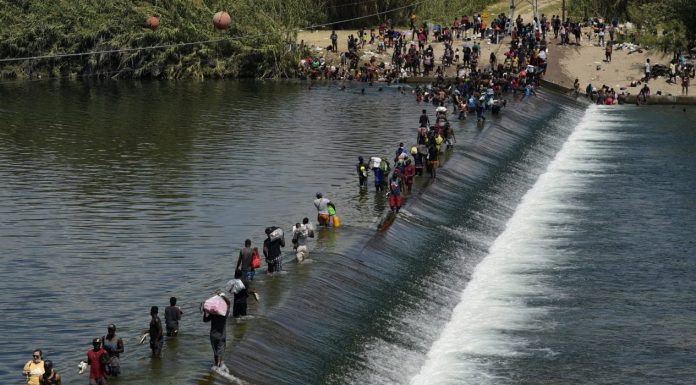(Headline USA) Facing bipartisan criticism over its approach to immigration, the Biden administration on Thursday announced new rules that require authorities to pursue only migrants who recently crossed into the country without permission or are deemed to pose a threat to public safety.
The move effectively neutralizes the entire Immigration and Customs Enforcement agency, which operates within US borders to arrest and deport illegal immigrants. The Biden immigration has allowed hundreds of thousands already into the nation’s interior, which it now has no plans of attempting to remove, despite taking an oath to faithfully execute and uphold the law.
The new guidelines replace interim rules issued in February and initially blocked by a federal judge in August as part of a lawsuit brought by Texas and Louisiana.
They break from a more law-minded approach to immigration enforcement under former President Donald Trump, who early in his presidency directed authorities to apprehend anyone who was in the country illegally.
The release comes as President Joe Biden faces Republican criticism that he hasn’t done enough to counter a sharp increase in migrants seeking to enter the country. His administration claimed it had expelled about 5,000 Haitians who crossed the U.S.-Mexico border at Del Rio, Texas, in recent weeks. But could not account for thousands more that had disappeared into the country’s interior, with an estimated 20% of them testing positive for the deadly coronavirus.
Department of Homeland Security Secretary Alejandro Mayorkas told reporters that the new policy was based on the reality that the U.S. can’t go after all people in the country without legal status and shouldn’t try because many “have been contributing members of our communities for years.”
Authorities will be directed to focus on noncitizens who have crossed recently, defined as after Nov. 1, 2020, or who determined to be a threat because of “serious criminal activity.” Homeland Security includes ICE and the Border Patrol.
Unlike the interim rules, the criminal activity is not limited to the category known in legal terms as an aggravated felony but will depend on the “totality of the facts and circumstances,” Mayorkas said. The new rules take effect Nov. 29.
Immigration authorities would be prohibited from arresting and seeking to deport someone in retaliation for exercising First Amendment rights, such as joining a protest or taking part in union activities.
“We are requiring and frankly empowering our workforce, critically empowering our workforce, to exercise their judgment, their law enforcement judgment,” the secretary said.
Advocates for immigration enforcement have criticized the interim guidelines, which were similar in intent as the newly released rules, as a top-down approach that precluded low-level arrests which might yield investigative leads into bigger cases or help serve as a deterrent to illegal immigration.
A federal judge in Texas blocked the interim rules in August, ruling that the administration did not have discretion to choose which migrants to detain, but a federal appeals court allowed the guidelines to take effect while the lawsuit proceeds.
Mayorkas said it makes little sense to pursue all of the estimated 11 million people in the country without legal status, even if the U.S. had the law enforcement capacity to do so. Most estimates regard this number to be much higher, particularly since the influx of illegals through Biden’s open-borders policy.
But Mayorkas, again ignoring his job duties to uphold federal law, claimed he did have the discretion to pick and choose based on his subjective value judgments that most of those who violated national sovereignty by invading the country were generally well-intentioned.
“They contribute to the well-being of our country and justice requires that we exercise our discretion accordingly,” he said. “The fact that an individual is a removeable non-citizen should not alone be the basis of an enforcement action against them.”
Trump’s administration took hundreds of measures to restrict both legal and illegal immigration, including a zero-tolerance policy on border crossings and requiring asylum seekers to await the processing of their cases in Mexico.
In the end, total deportations were higher under the first term of President Barack Obama, who enacted enforcement priorities similar to Biden’s, than under Trump. That was due in part to a lack of cooperation from many far-left “sanctuary” cities and states whose leaders opposed Trump’s immigration policies.
Adapted from reporting by the Associated Press

